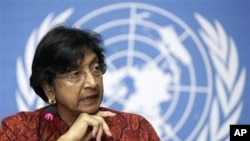Human rights violations were the rule rather than the exception in 2010. The United Nations says crimes such as mass rapes, torture, extra-judicial executions, arbitrary detention, disappearances remain widespread throughout the world. Even democratic societies are experiencing an erosion of human rights due to the so-called war on terror and growing xenophobia.
[Thanks to) "Bob Marley for allowing us to use that inspiring music as part of our campaign against discrimination," said Navi Pillay. "It is certainly uplifting."
U.N. Human Rights Chief Navi Pillay is capping off a turbulent year by celebrating the Universal Declaration of Human Rights. Throughout the past 62 years, the Declaration has acted as a guide for human-rights values and a beacon of hope for millions of oppressed and abused people.
She marks its achievements on Human Rights Day by honoring the hundreds of thousands of human-rights defenders who speak up against discrimination, often at great cost to themselves and to their loved ones.
"While combating discrimination and other important human rights causes, they themselves are often subject to discrimination," she said. "In fact, every year, thousands of human-rights defenders are harassed, abused, unjustly detained and even murdered."
Geneva Director for Human Rights Watch, Julie de Rivero says it is hard to say whether the situation of human rights now is better or worse than in previous years. But it is possible to detect certain patterns.
One of these, she says, is impunity for major violations. She gives Sri Lanka as an example.
"We saw the war end in Sri Lanka, but at a very high cost for civilians that were caught in indiscriminate fire by both sides," said Julie de Rivero. "And, yet, no accountability for war crimes in that country…And last of all, I would say the Bush era cases of torture that were committed under the guise of the war on terror that have remained unaccounted for and for which there is still impunity."
De Rivero says the war on terror and heightened concern for national security are leading to a further erosion of human-rights values, even in democratic societies. She says the same fears are increasing xenophobic sentiments in European countries.
She says another worrying trend is sexual violence against women, particularly in the Democratic Republic of Congo.
"The scale of the phenomenon, I think, always compels us to focus on this particular situation because rape has been so normalized as a weapon of war in that country that it is shocking and the devastation that it causes is incredible in the lives of individuals and the community," she said.
"I think you have certain human rights violations that just continue year after year," said Rupert Colville.
Rupert Colville is Spokesman for the U.N. High Commissioner for Human Rights.
"You get some progress and then you get backsliding on something like torture," he said. "Almost all states have laws that prohibit torture and declare it a crime. And, yet many states are still practicing it and many States do not prosecute those who commit it."
He says impunity for a whole range of crimes is a major concern, as is discrimination.
"Discrimination against women, discrimination against homosexuals, discrimination against people with disabilities, the elderly, many, many groups - minorities, indigenous peoples," said Colville. "So, that is a constant theme really on every continent, including in the developed countries, where I think the treatment of migrants or foreigners has clearly deteriorated in the past decade or so."
Colville notes the wheels of justice often grind slowly. He says it can take years for the victims to get redress, but it does happen.
"As we have seen, there is Chile and Argentina for example," he said. "You do not need to give up hope. Twenty-thirty years down the line, people still are being brought to court and charged with serious crimes. You still see people being brought to courts for crimes during World War II. So, that perhaps is the strength of the system. It is that with these very serious crimes there is no statute of limitations. Circumstances do change and people who think they are actively immune to justice sometimes find that is not actually the case in the long term."
The efforts of people who fight for human rights are supported by a body of international human rights law.
Nine core international human-rights treaties lay out the rights and protections afforded individuals against specific violations. They specify the obligations and responsibilities of States toward their citizens.
Laws are no guarantee of good behavior. But states that have signed treaties are more likely to be persuaded to implement them.
Human Rights Violations the Rule Not Exception in 2010
- By Lisa Schlein








